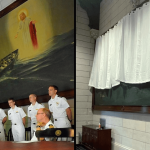A Galilean carpenter once famously said that the way we treat those who are the least among us is the way we treat our God (Matthew 25:31-36). It’s something Christians have taken to heart in the many years since, something we hold true in a way that is more than just symbolic. We believe that the way we love God is by loving other human beings—especially victims of injustice and oppression: the least of these.
In our world today, however, who is really the least? Granted, it often feels like injustice is everywhere we look, and stories that cry out to be heard are numerous. Some of the most heartbreaking examples, however, come from the lives of those that society seems determined to keep in their unwilling role as “the weaker sex.”
We are conditioned to see God in the stories of men. King David, Isaiah, Paul. Shepherd, prince, hero. Influential pastors decry the church for being effeminate, for having female qualities as well as male ones, subtly implying that the Divine shows itself better in maleness than in femaleness.
But, despite it all, God often shows up in the eyes of a woman.
God is the Indian widow blamed for the death of her husband (no matter what the actual cause) and made to be an “it” in the eyes of society.
God is the daughter, wife, or girlfriend beaten, abused, and endangered by the man in her life—often with little sympathy from leaders who caution her to remain “submissive.”
God is the baby girl in China unwanted, unloved, abandoned, or aborted, simply because she is not a son instead.
God is the college student in New Delhi who is rightly afraid every time she leaves her house and enters a public space, who has to fear for her life and her body in a society where the law is often against her and sympathy can be hard to find.
God is the motherless HIV/AIDS orphan in Africa, already assumed to be sick with a devastating disease.
God is the teenage girl in rural Nepal, tricked and sold against her will into the dismal world of forced prostitution.
God is the little girl in the American foster system, lost and alone.
God is the pastor’s wife blamed for her husband’s infidelity—with another man—because she was probably “unavailable” and had “let herself go.”
God is the homeless lesbian girl who was kicked out of her house and left with nowhere to go but the streets because her parents found out, who experiences unique risks because of her sexuality.
God is each of the hundreds of thousands of girls and women each year who are pinned down and forced to submit to the torture of female genital mutilation.
God is every single one of the estimated one billion women who will be raped or beaten in her lifetime.
Listen to their stories. Look into their faces. Pray for their hearts and lives.
They are least, and yet valued beyond measure.
In them, we see our God.














